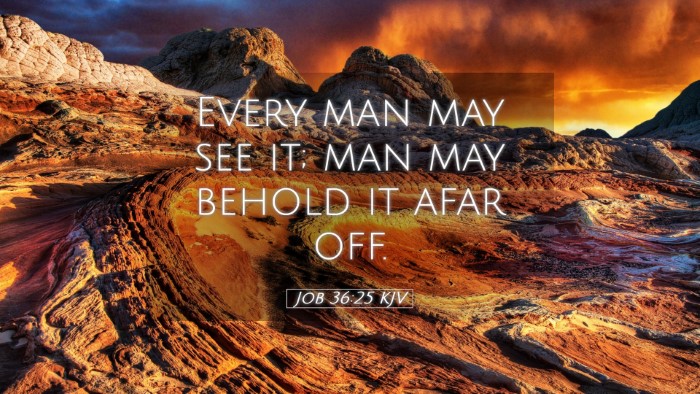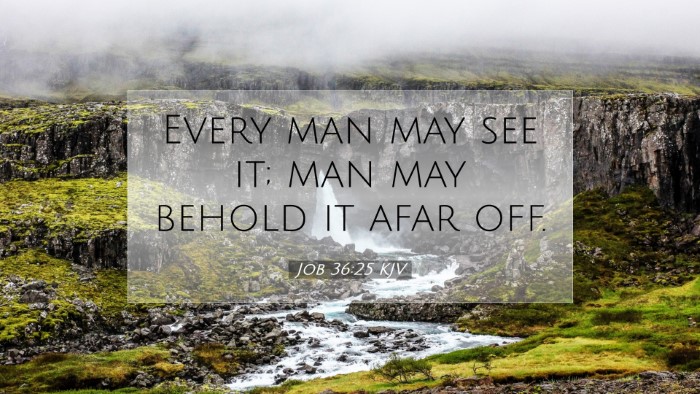Commentary on Job 36:25
Verse: “They look to the earth, but behold, trouble and darkness, gloom of anguish; and they are driven to the edge of darkness.” (Job 36:25, ESV)
Introduction
The verse in Job 36:25 serves as a poignant reminder of the human condition in the face of divine sovereignty. It reflects on the limitations of human perception when confronted with the realities of suffering and the mysteries of God’s governance. In our exploration, we incorporate insights from well-respected public domain commentaries to enrich our understanding of this profound scripture.
Contextual Background
Before delving into the commentary, it is essential to understand the broader context of the Book of Job. This book deals with profound themes of suffering, divine justice, and human misunderstanding of God's methods. Job, a man of integrity, suffers severe calamities, prompting theological debates among him and his friends about God’s nature. Chapter 36, where our verse is situated, features Elihu, who speaks with a blend of youthful zeal and theological insight, aiming to redirect Job’s perspective toward the majesty of God.
The Focus on God’s Majesty
Elihu emphasizes the greatness of God and His unfathomable ways. His speech underscores that often, human beings fail to grasp the essence of God’s plans, as seen in Job 36:25, which highlights the disparity between earthly troubles and the divine order.
Commentary Insights
Matthew Henry’s Commentary
Matthew Henry, in his commentary, points out that the observation of troubles on earth often leads people to despair. Job’s friends viewed his suffering as a punishment, reflecting how human interpretations can misrepresent divine intentions. Henry emphasizes that while the earth presents a picture of chaos and darkness, we must remember that God's ways are higher than our ways.
Key Points from Henry:
- The Human Lens: Henry notes that the phrase "look to the earth" symbolizes a limited human perspective focused solely on worldly experiences and struggles.
- The Contrast: The struggle of humanity contrasted with the majesty of God — while humans may experience gloom, God remains sovereign and unchangeable.
- The Call for Perspective: Believers are called to acknowledge their limitations and seek a higher understanding through faith in God’s character.
Albert Barnes’ Notes on the Bible
Albert Barnes commends Elihu’s perspective, suggesting that true wisdom acknowledges the imperfections of human understanding. He interprets this verse as a recognition of God’s omnipotence, suggesting that while humanity may face dire circumstances (“trouble and darkness”), there exists a divine plan beyond immediate perception.
Key Insights from Barnes:
- God’s Nature: Barnes reiterates that God's decisions, although sometimes inscrutable, are always just and wise, encouraging readers to trust in God's nature rather than their understanding.
- Beyond Troubles: He emphasizes that the troubles faced in life are momentary compared to God's eternal plan. Faith calls for an expectation of eventual deliverance, which may not be visible at present.
- Divine Sovereignty: The acknowledgement of God’s sovereignty offers comfort amidst hardship, reinforcing the idea that believers should not be overwhelmed by their present circumstances.
Adam Clarke’s Commentary
Adam Clarke provides a deep theological perspective on this verse. He interprets the darkness and anguish described in Job 36:25 as representative of the moral and spiritual disarray resulting from human sin. Clarke carefully articulates the importance of recognizing God’s controlling hand over creation, even in chaos.
Important Points from Clarke:
- Existential Realities: Clarke suggests that the suffering experienced in life is not devoid of purpose but is part of God's overarching narrative of redemption.
- A Call for Reflection: He calls believers to reflect on their circumstances in light of faith, looking beyond the immediate darkness to the greater light of God’s truth.
- Spiritual Response: Clarke emphasizes the necessity of a spiritual response to earthly troubles, urging believers to seek wisdom and understanding through prayer and reliance on God's Word.
Application to Life
The insights gained from these commentaries guide both pastors and laypersons in their journey of faith. Here we offer applications based on Job 36:25:
Embracing the Mystery of God
Recognizing that God's ways often transcend human understanding encourages believers to embrace the mystery of divine providence. In moments of despair, it is vital to look beyond immediate circumstances and trust in God's ultimate wisdom and love.
Finding Hope in Darkness
The assurance that God is sovereign during times of darkness helps foster resilience. Pastors can encourage their congregations to be grounded in faith, reminding them that afflictions are not the end but a part of the journey that can lead to spiritual maturity.
Community Support and Wisdom
Fostering a community that engages in deep theological discussion can be beneficial. By encouraging open conversations about suffering and God’s nature, believers can strengthen one another and gain a broader understanding of the complexities of faith and life.
Conclusion
Job 36:25 challenges readers to confront the limits of human perspective in the face of divine mystery. Drawing from Matthew Henry, Albert Barnes, and Adam Clarke lends depth to this verse, illustrating that though we may look upon the earth and see trouble, faith invites us to perceive the truths of God's nature that persist beyond our immediate experiences. In exploring these insights, we gain not merely knowledge but also wisdom, equipping us to face life's challenges with grace and steadfast hope.


